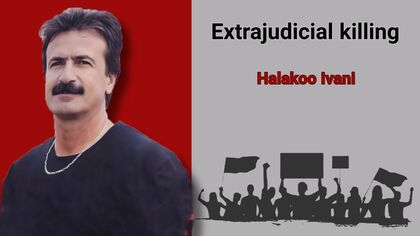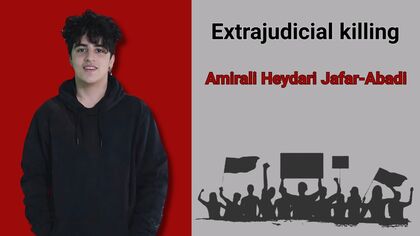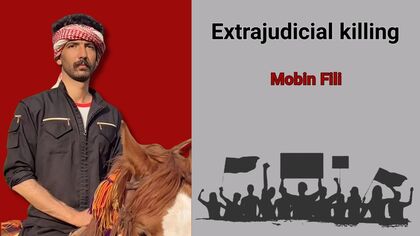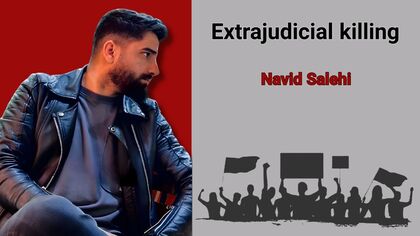Iranian Lawyers Need Independence
16:00 - 28 February 2012

26 February 2012 marks the 58th anniversary of the Iranian Bar Association’s independence. In February 1954, after a tireless campaign by some prominent lawyers, Iran’s legislators passed a law recognizing the independence of the Bar. This victory was in part meant to allow lawyers to defend the rights of their clients without repercussions and state intervention. Nonetheless over the last 58 years Iranian authorities have continually infringed upon the work of lawyers and eroded the independence of their Bar Association.
Independence of lawyers and the legal profession is essential for the promotion and protection of human rights and the fair administration of justice. Independent lawyers can advocate on behalf of clients, even when the clients are part of minority groups, are poor, criticize the powerful, hold unpopular opinions, or are accused of horrid acts. By doing so, lawyers can advance the rule of law, challenge government abuse, and ensure that the even weakest among us has a voice and a fair trial. At their best, lawyers help guarantee that no one is deprived of their freedom, rights, or life without being able to first defend themselves.
In Iran many lawyers have played this role by defending human rights principles, including freedom of expression, religious freedom, and labor rights, as well as by fighting against discrimination and cruel punishments.
Farideh Gheirat, for example, has represented many women’s rights activists, including Shadi Sadr and Asieh Amini.
Yusef Mowla’i represented union leader Mansour Osanloo and human rights defender Emad Baghi against arbitrary detention.
Khalil Bahramian, Mohammad Reza Faqihi, Seyed Ali Mojtahedzadeh, Saeed Khalili, and Mohammad Oliaifar have represented many activists and individuals detained before and after the disputed 2009 presidential election.
Mostafa Daneshjoo, Farshid Yodallah, and Amir Eslami all represented members of the Gonabadi Sufi order and have faced prison for doing so.
Other lawyers have helped women escape domestic abuse, challenged stoning sentences, and defended Kurdish rights activists.
For their legal and human rights advocacy, many lawyers have faced persecution at the hands of Iranian authorities. Abdolfattah Soltani, Nasrin Sotoudeh,Mohammad Seifzadeh, and Javid Houtan Kiyan are among the human rights lawyers who are currently imprisoned in Iran for doing their jobs.
Despite setbacks, many of these Iranian human rights lawyers have had notable success both in the courtroom and through public advocacy.
They have taken on cases many would fear to take on. On occasion, their representation has resulted in freedom for prisoners of conscience. Other times, these lawyers have helped mitigate harsh sentences.
Lawyers have also raised awareness about the systematic violation of human rights. For example, it was the diligent work of lawyers like Nasrin Sotoudeh on behalf of juvenile offenders facing the death penalty that recently resulted in a modification of execution laws in the new Penal Code. While the new penal code does not entirely abolish juvenile executions, which are illegal under international law, it does create limitations on the use of the punishment and is a step in the right direction.
Most importantly, Iranian human rights lawyers continually promote the idea that Iran’s judges and Judiciary are obligated to uphold the rights guaranteed in domestic and international laws. By doing so, they have helped to slowly further a culture that respects human rights and rule of law. While lawyers are not alone in this pursuit, sharing the effort with numerous journalists, human rights defenders, and others, they are certainly an indispensable part of Iran’s human rights movement and a consistent voice for rule of law. As such, the independence of lawyers is worth fighting for today.
Unfortunately, it is the very independence of these lawyers that is under attack by the government. Since June 2009, at least 42 lawyers have faced government persecution in the form of imprisonment, criminal prosecution, and harassment simply for defending their clients and promoting human rights. The Judiciary has essentially criminalized human rights-based lawyering and tried to purge the legal community of anyone willing to represent prisoners of conscience.
Moreover, the Iranian Central Bar Association, whose very purpose is to promote and defend the rights of lawyers in Tehran, has been mute on the subject. This underscores the fact that 58 years since the first bar association became legally “independent,” Iranian bar associations are still restricted by the government in many ways.
After the 1979 Revolution, authorities suspended the existing bar association for nearly 18 years and appointed a judicial representative to oversee the bar. From 1979 to 1997, many independent-minded lawyers were disbarred. Before authorities issued orders to re-open the Bar Association, they passed the Law on Attorney Qualifications, which would effectively curtail the Bar Association’s independence.
The Law on Attorney Qualifications, enacted in 1997, gives the Judiciary authority to vet and exclude candidates from membership in the Bar Association’s Board of Directors. While the Bar’s members technically elect the board every two years, the Judiciary’s Supreme Disciplinary Court of Judges, which often defers to the Ministry of Intelligence, can disqualify any candidate it sees as unfit.
In practice, the Supreme Disciplinary Court of Judges has repeatedly barred human rights lawyers, including Shirin Ebadi, Farideh Gheirat, Abdolfattah Soltani, Mohammad Seifzadeh, and Nemat Ahmadi, from running for and sitting on the board of the Iranian Central Bar Association.
According to the website of the Iranian Bar Association Union, an umbrella organization that includes the Iranian Central Bar Association, the majority of Bar members object to the Judiciary’s control over their board of directors. Nonetheless, the Judiciary’s control over the Bar has resulted in a Bar Association and legal community that lack the power to defend its independence.
The International Bar Association (IBA) and human rights organizations have expressed concern at the government control over the Iranian Bar. Martin Solc, Co-Chair of the IBA’s Human Rights Institute, said in 2009 that Iran is violating “the United Nations Basic Principles on the Role of Lawyers by fundamentally disregarding the imperative to have an independent legal profession and by subjecting Iranian lawyers to ultimate control of the Judiciary.”
It is vital that the Iranian Bar break through the Judiciary’s control and come to the aid of its members. Bar associations in countries around the world and the United Nations Special Rapporteur on the independence of judges and lawyers should also support the Iranian bar associations and combat Iran’s attack on lawyers. Until lawyers are able to practice freely, Iranians will not attain human rights.
Source: International Campaign for Human Rights in Iran
Independence of lawyers and the legal profession is essential for the promotion and protection of human rights and the fair administration of justice. Independent lawyers can advocate on behalf of clients, even when the clients are part of minority groups, are poor, criticize the powerful, hold unpopular opinions, or are accused of horrid acts. By doing so, lawyers can advance the rule of law, challenge government abuse, and ensure that the even weakest among us has a voice and a fair trial. At their best, lawyers help guarantee that no one is deprived of their freedom, rights, or life without being able to first defend themselves.
In Iran many lawyers have played this role by defending human rights principles, including freedom of expression, religious freedom, and labor rights, as well as by fighting against discrimination and cruel punishments.
Farideh Gheirat, for example, has represented many women’s rights activists, including Shadi Sadr and Asieh Amini.
Yusef Mowla’i represented union leader Mansour Osanloo and human rights defender Emad Baghi against arbitrary detention.
Khalil Bahramian, Mohammad Reza Faqihi, Seyed Ali Mojtahedzadeh, Saeed Khalili, and Mohammad Oliaifar have represented many activists and individuals detained before and after the disputed 2009 presidential election.
Mostafa Daneshjoo, Farshid Yodallah, and Amir Eslami all represented members of the Gonabadi Sufi order and have faced prison for doing so.
Other lawyers have helped women escape domestic abuse, challenged stoning sentences, and defended Kurdish rights activists.
For their legal and human rights advocacy, many lawyers have faced persecution at the hands of Iranian authorities. Abdolfattah Soltani, Nasrin Sotoudeh,Mohammad Seifzadeh, and Javid Houtan Kiyan are among the human rights lawyers who are currently imprisoned in Iran for doing their jobs.
Despite setbacks, many of these Iranian human rights lawyers have had notable success both in the courtroom and through public advocacy.
They have taken on cases many would fear to take on. On occasion, their representation has resulted in freedom for prisoners of conscience. Other times, these lawyers have helped mitigate harsh sentences.
Lawyers have also raised awareness about the systematic violation of human rights. For example, it was the diligent work of lawyers like Nasrin Sotoudeh on behalf of juvenile offenders facing the death penalty that recently resulted in a modification of execution laws in the new Penal Code. While the new penal code does not entirely abolish juvenile executions, which are illegal under international law, it does create limitations on the use of the punishment and is a step in the right direction.
Most importantly, Iranian human rights lawyers continually promote the idea that Iran’s judges and Judiciary are obligated to uphold the rights guaranteed in domestic and international laws. By doing so, they have helped to slowly further a culture that respects human rights and rule of law. While lawyers are not alone in this pursuit, sharing the effort with numerous journalists, human rights defenders, and others, they are certainly an indispensable part of Iran’s human rights movement and a consistent voice for rule of law. As such, the independence of lawyers is worth fighting for today.
Unfortunately, it is the very independence of these lawyers that is under attack by the government. Since June 2009, at least 42 lawyers have faced government persecution in the form of imprisonment, criminal prosecution, and harassment simply for defending their clients and promoting human rights. The Judiciary has essentially criminalized human rights-based lawyering and tried to purge the legal community of anyone willing to represent prisoners of conscience.
Moreover, the Iranian Central Bar Association, whose very purpose is to promote and defend the rights of lawyers in Tehran, has been mute on the subject. This underscores the fact that 58 years since the first bar association became legally “independent,” Iranian bar associations are still restricted by the government in many ways.
After the 1979 Revolution, authorities suspended the existing bar association for nearly 18 years and appointed a judicial representative to oversee the bar. From 1979 to 1997, many independent-minded lawyers were disbarred. Before authorities issued orders to re-open the Bar Association, they passed the Law on Attorney Qualifications, which would effectively curtail the Bar Association’s independence.
The Law on Attorney Qualifications, enacted in 1997, gives the Judiciary authority to vet and exclude candidates from membership in the Bar Association’s Board of Directors. While the Bar’s members technically elect the board every two years, the Judiciary’s Supreme Disciplinary Court of Judges, which often defers to the Ministry of Intelligence, can disqualify any candidate it sees as unfit.
In practice, the Supreme Disciplinary Court of Judges has repeatedly barred human rights lawyers, including Shirin Ebadi, Farideh Gheirat, Abdolfattah Soltani, Mohammad Seifzadeh, and Nemat Ahmadi, from running for and sitting on the board of the Iranian Central Bar Association.
According to the website of the Iranian Bar Association Union, an umbrella organization that includes the Iranian Central Bar Association, the majority of Bar members object to the Judiciary’s control over their board of directors. Nonetheless, the Judiciary’s control over the Bar has resulted in a Bar Association and legal community that lack the power to defend its independence.
The International Bar Association (IBA) and human rights organizations have expressed concern at the government control over the Iranian Bar. Martin Solc, Co-Chair of the IBA’s Human Rights Institute, said in 2009 that Iran is violating “the United Nations Basic Principles on the Role of Lawyers by fundamentally disregarding the imperative to have an independent legal profession and by subjecting Iranian lawyers to ultimate control of the Judiciary.”
It is vital that the Iranian Bar break through the Judiciary’s control and come to the aid of its members. Bar associations in countries around the world and the United Nations Special Rapporteur on the independence of judges and lawyers should also support the Iranian bar associations and combat Iran’s attack on lawyers. Until lawyers are able to practice freely, Iranians will not attain human rights.
Source: International Campaign for Human Rights in Iran



